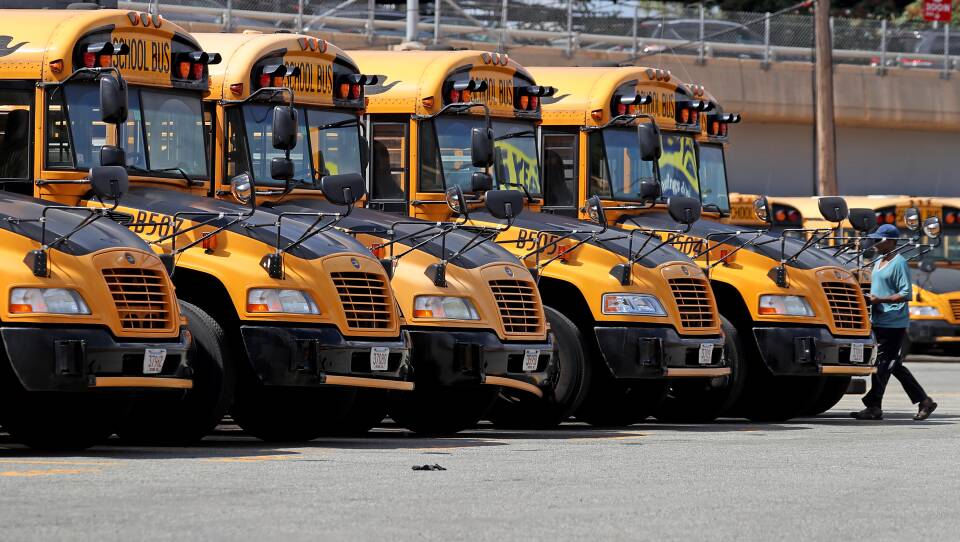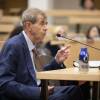With the official start of the school year just weeks away, and in the midst of a pandemic crisis whose continued magnitude and duration are unknown, Boston Mayor Marty Walsh has found himself caught between a rock and a hard place.
Walsh is engaged in an increasingly public and at times acrimonious tug of war with one of the city’s most influential employee unions — the Boston Teachers Union, which represents not only BPS teachers, but also school nurses and other professionals, and whose more than 10,000 members comprise the largest single public sector union in the city.
The gap between Walsh and the influential teachers union was not always so wide.
In the city’s 2013 mayoral election, then-candidate Walsh received a boost from union teachers in the form of an unsolicited, nearly half-million dollar TV ad blitz supporting Walsh over opponent John R. Connolly — paid for by the American Federation of Teachers, with which the BTU is affiliated.
While it’s by no means clear the ad buy affected the race, it marked the ascendance of the Boston Teachers Union as a rising political force in a city that had just held its first open mayoral election in more than two decades, and a force few politicians would care to run afoul of.
Now, Walsh (who has not yet said he’s running for re-election next year but has more than strongly hinted he intends to) finds himself at something of a political crossroads. A proud union advocate whose political career is rooted in the city’s trade unions, he is facing off with an increasingly frustrated BTU over a draft school reopening plan released by the Boston Public Schools this week.
The draft plan would allow any student to opt for all-remote learning, but also includes a potential “hybrid” or “hopscotch” option for students, which would mean students and teachers returning to physical classrooms in several weeks.
The BTU, and many of its individual members, say that scenario is unworkable, and will endanger teachers and students alike and say they were effectively “locked out” of conversations informing BPS’ draft plan.
“We want to go back to our school buildings and engage in in-person learning with our students, but no students or staff should be asked to risk their lives or their loved ones by going back in person, not in Boston, and not anywhere, even under a hybrid plan,” BTU President Jessica Tang said in a statement Thursday.
Walsh, meanwhile, has at times voiced frustration with the BTU, calling a protest by school nurses and other BTU members last week a “political” maneuver, while also insisting that the school district has sought the input of BTU members and continues to do so.
"The Superintendent has made clear that she is prioritizing the health and safety of our students, staff, and families above all else as we plan for school this fall,” Walsh said Thursday in a statement to WGBH News.
A spokesman for BPS told WGBH News that the district has held more than 30 community meetings about the draft plan already. And the mayor has emphasized that no final decision has been made yet and that he welcomes the continued input of all stakeholders, including the BTU.
It’s not the first tangle between public sector unions and Walsh, who still retains strong political and financial support from the city’s trade unions.
But it’s undoubtedly the biggest such confrontation — and one that has opened a widening gap between Walsh and the teachers union through which several prominent Boston politicians have risen to take sharp aim at the mayor, among them potential challengers to Walsh in next year’s mayoral election.
That includes Boston City Councilor At-Large Michelle Wu, the Council’s top vote-getter in the last two elections, and 4th District Councilor Andrea Campbell — both of whom have been critical of Walsh on several fronts and who are widely presumed to be at least contemplating running for mayor next year (neither has publicly stated an intent to do so).
Wu has joined teachers in calling on BPS leadership to take its hybrid plan off the table, for now, and begin the school year with all-remote learning.
A report released by Wu Thursday making that case includes a point-by-point critique of the district’s current, draft plan, saying it lacks coherent strategies in terms of everything from how students will be safely bused to what role testing will or won’t play in schools, to concrete policies on how schools will respond if COVID-19 cases are detected.
“We’re a little over a month away from starting school at this point, and many of the conversations right now feel like ones that should have happened a long time ago,” Wu told WGBH News. “We are left with just as much uncertainty at this point as we were when the pandemic first began.”
Meanwhile, City Councilor Andrea Campbell, who represents largely majority-minority parts of Dorchester and Mattapan, has also taken aim at the schools plan, and is likewise calling for BPS to begin the year on an all-remote basis, both to protect student and teacher safety and to develop better models for in-classroom learning.
Campbell says the district needs to provide substantially more detail on everything from school safety to child care options for parents who cannot stay home — including many parents of color and working-class parents in her district who simply cannot afford to remain at home with their children, even in a “hybrid” schooling model.
“I know while some parents don’t want to send their kids back to the classroom, some do. This is not an easy decision for anyone,” Campbell told WGBH News. “We cannot rush this, though.”
In calling for Boston schools to begin on an all-remote basis, both Wu and Campbell’s positions fall essentially in line with similar calls from the BTU; but they’ve also positioned themselves at slightly different distances from the teachers union.
Asked whether she agreed with BTU assertions that union members have been largely left out of the school district’s planning process, Wu said: “Yes.”
“My understanding was that these plans were done essentially by BPS and then presented at the [School Committee] meeting,” Wu said. “It doesn’t seem like there was an opportunity for stakeholders to really have impact.”
Campbell said because she was not in the room for discussions between the district and the BTU, she cannot say whether the union's grievances around being excluded from reopening discussions are justified. She added that she is focused primarily on input from families and students in her district.
As to whether she agreed with Walsh’s characterization of BTU protests as “political,” Campbell said, “This is not the time to be political with any of this.”
Meanwhile the BTU, for its part, has not formally embraced seemingly like-minded politicians like Wu and Campbell (the BTU has not, for example, commented on Wu’s report issued Thursday); and BTU President Jessica Tang said in a statement Thursday that, despite their clear differences with the Walsh administration, the union is “…Looking forward to working with City Hall and the district to plan and to prepare for a reopening that is safe, equitable and healthy for everyone.”
As for Walsh, the mayor has seemingly sounded a more conciliatory note since further inflaming the BTU by criticizing its protest.
Walsh has stressed that the draft plan is just that — a draft — and that any decision will be based on where COVID-19 cases stand as school opening day approaches.
And Walsh is hardly alone in facing the dilemma of reopening. Similar tensions are playing out in towns cities across the commonwealth.
Massachusetts AFL-CIO president Steven Tolman, said his organization is advocating aggressively at the state level for protections for all public sector workers.
Tolman, a longtime labor leader who relates to Walsh’s own union roots, declined to weigh in on tensions between the mayor and the BTU.
“I think he’s getting the conversation started to [see] where it will end up,” Tolman said.
But he acknowledged that pro-union Walsh is in a difficult position.
“It’s not an easy one, but it’s the one he chose,” Tolman said. “The truth is, he’s the mayor of the city now. He's not a union representative.”
This article has been updated.
Correction: A previous version of this story incorrectly spelled Steven Tolman's name.






